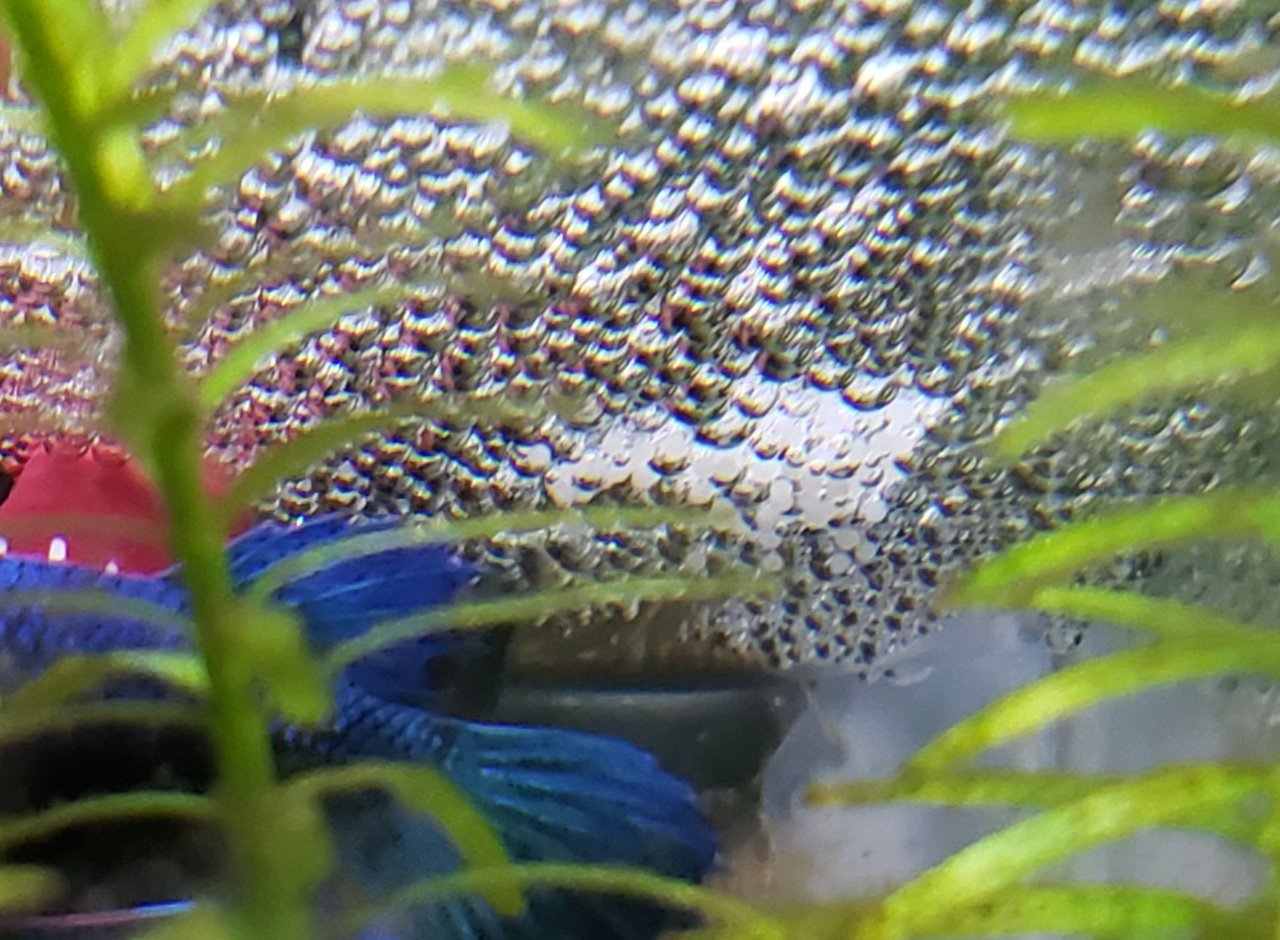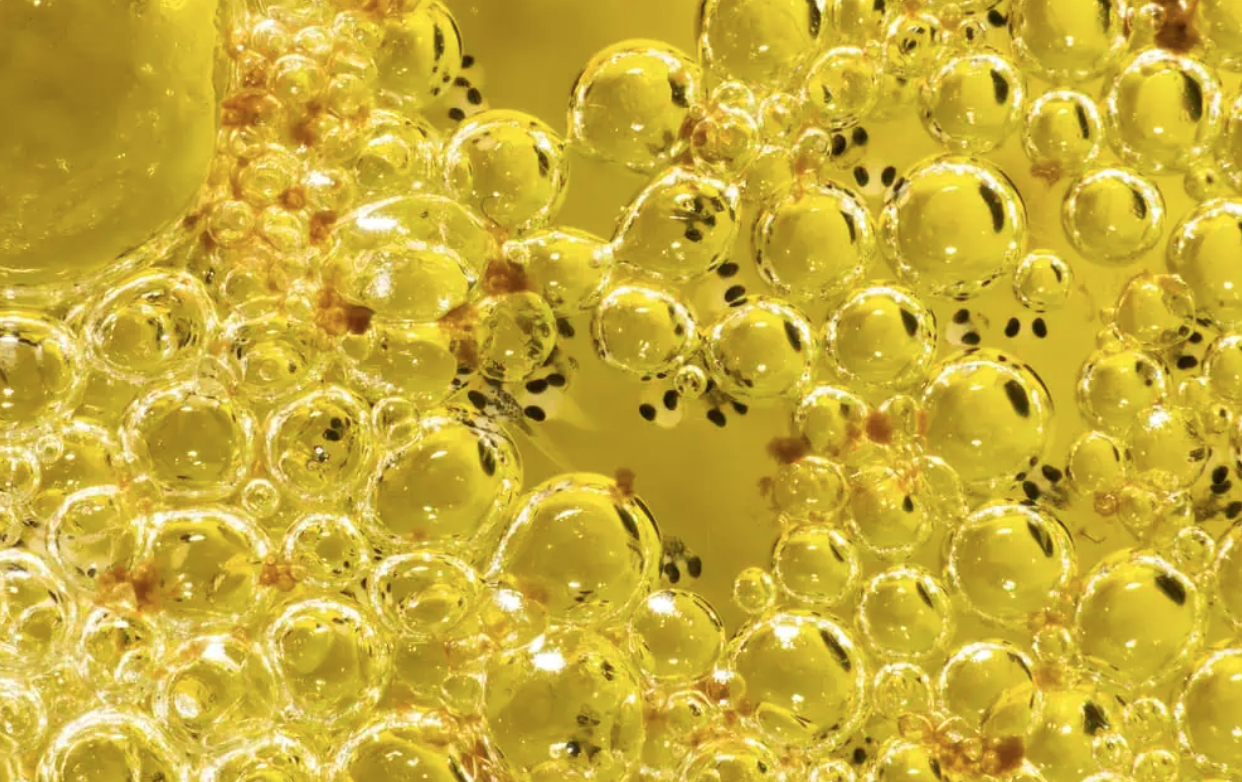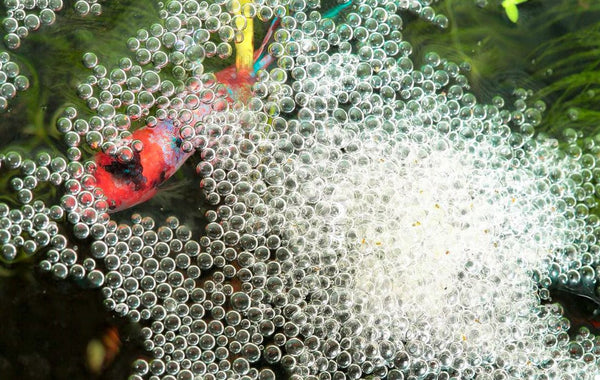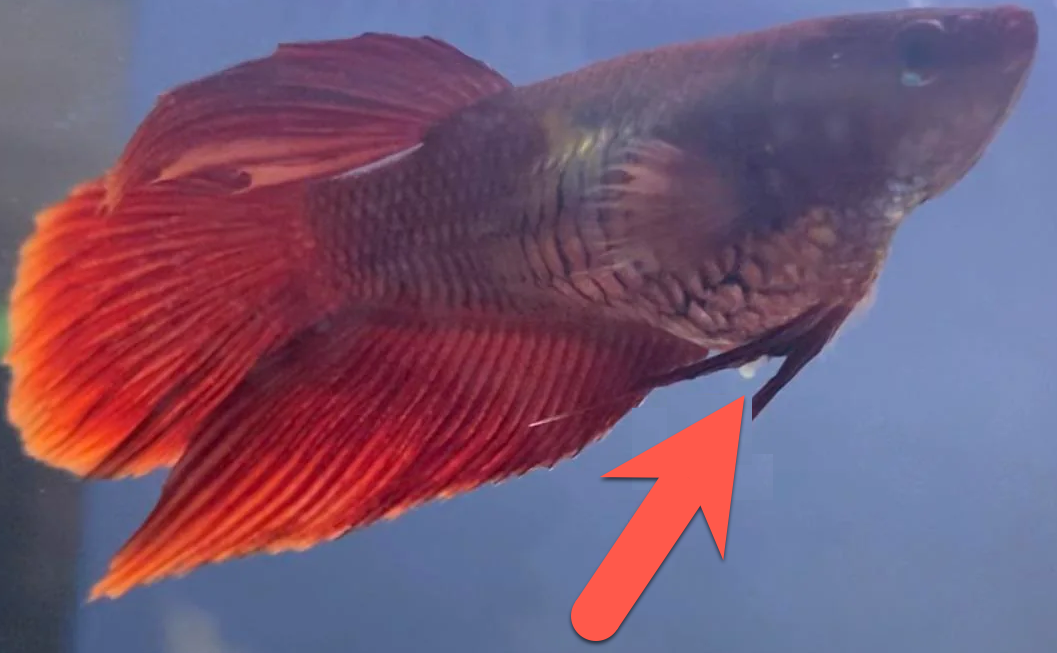Betta Fish Eggs 101: Size, Appearance, Hatching Time & More

Bubble nest made by males to protect betta eggs. Credit: myaquariumclub.com
Betta Fish Eggs Quick Overview
Click here if you’ve got eggs in your tank…must read…
Betta fish, renowned for their vibrant colors and flowing fins, have unique breeding behaviors that captivate aquarists. Understanding their eggs is a crucial step in the rewarding journey of breeding these stunning fish. From selecting a healthy pair to raising the fry, prepare yourself for an exciting adventure!
What Do Betta Fish Eggs Look Like?

Betta eggs & tiny fry developing. photo credit: bettafishbay.com
- Tiny Orbs: Betta fish eggs resemble miniature pearls, initially about 1mm in size and white in color. They have a slightly oval, rather than perfectly round, shape.
- Signs of Life As the embryo develops, you’ll notice two distinctive black dots – the baby betta’s eyes! Soon, you might even see the outline of the entire embryo inside.
- Mouthbrooder Differences: Eggs of mouthbrooding betta species are larger (2-3mm) and take longer to hatch.
Betta Fish Eggs Hatching Time
Click here for my favorite guide on raising fry
Betta fish eggs develop remarkably quickly, but several factors influence hatching time:
- Tropical Warmth: Bettas thrive in warm water – ideally 78-82°F. Cooler temperatures slow development, while a warmer range around 79-82 °F encourages faster growth and a higher survival rate.
- Cleanliness is Crucial: High water quality is essential. Dirty water can lead to harmful chemicals or excess waste that damages eggs and fry. Do a water change before spawning and add catappa leaves or a sponge filter for added protection.
- Species Matters: Bubble-nesting bettas have fast-developing eggs, often hatching in 24-72 hours. Mouthbrooders, like Betta macrostoma, can take upwards of a month!

Credit: Buce Plant
How to Know if Betta Fish Eggs Are Fertilized
From struggles to success: a betta breeder shares their experience to success
- Look for Growth: Fertile eggs show signs of development, such as those telltale black dots and a visible embryo. Close to hatching, you may even see a tiny fish inside with a white yolk sac.
- Unfertilized Eggs: These remain white or become fuzzy with fungus – a sign they won’t hatch. The male betta will typically eat unfertilized or damaged eggs.
How Many Eggs Do Betta Fish Lay?
Betta fish lay anywhere from 100 and up to 500 eggs in a single mating session, however the average is generally about 250+.

Egg spot shown here – credit: reddit user Sea-Explanation4816
Prepare to be amazed, female betas have an oviposter tube where eggs come from which is called an “egg spot”! Several factors influence the number of eggs a female betta produces:
- Size and Age: Larger, mature females tend to lay more eggs. A young betta (2-3 months old) may be sexually mature, but waiting until she’s full-grown (around 8 months to a year) yields the healthiest, biggest spawns.
- Conditioning: Properly conditioning the pair with a high-protein diet boosts egg production. Spawns can range from 30 to an astonishing 500 eggs, though smaller batches are common for less-experienced pairs or mouthbrooders (who typically lay 10-20 eggs).
Betta Fish Spawning: An Intriguing Dance
- Bubble Nest Builders: The male betta creates an elaborate nest of bubbles where the eggs will be protected (it usually takes a few hours to build). During spawning, the male and female engage in a captivating courtship, culminating in the release and fertilization of the eggs. You do not want to remove the bubble nest!
- Mouthbrooding Wonders: Certain betta species are mouthbrooders – the male (or less commonly, the female) carries the eggs in their mouth until hatching. This adaptation evolved in environments less suitable for bubble nests.
Caring for Betta Eggs
- Hygiene is Key: Carefully remove any unfertilized eggs to prevent fungus from harming healthy ones. Experienced breeders may use gentle water siphoning or natural antifungals like methylene blue or Indian almond leaves.
Fry Development and Care
- Minuscule Meals: Newborn betta fry are incredibly tiny and need specialized live food called infusoria for the first few days.
- Growth Stages: Within a week, fry becomes free-swimming and can eat slightly larger foods like baby brine shrimp. Soon, you’ll see their vibrant colors emerge!
Betta Fish Eggs vs. Other Fish Eggs
- Bubble Nest Architects: Most aquarium fish don’t create bubble nests. If you see eggs in a nest, it’s your bettas!
- Dedicated Mouthbrooders: Carrying eggs in the mouth is also exceptional behavior.
Betta Breeding in the Wild
Click here for my favorite resource on keeping a betta happy and thriving
Betta fish in their natural habitats, the lush rice paddies, and shallow streams of Southeast Asia face different challenges than their aquarium-kept counterparts. Their breeding habits have adapted to these environments in fascinating ways:
- Temporary Homes: Wild bettas often breed in temporary puddles or small pockets of water, where their eggs are less likely to be found by predators.
- Beyond the Bubble Nest: Not all betta species build bubble nests. Some scatter their eggs among vegetation for dispersal.
- Mouthbrooding Adaptations: Mouthbrooding bettas often inhabit streams with a slight current, making bubble nests impractical. Their larger jaws evolved to protect their developing young.
Final Thoughts
Breeding betta fish and raising their eggs is a captivating and educational experience. From the elaborate bubble nests to the dedication of mouthbrooding parents, bettas never cease to amaze! Whether you’re breeding for the first time or a seasoned expert, the process demands patience and a commitment to providing optimal conditions. With the right preparation and care, witnessing tiny betta eggs transform into a vibrant school of fry is an unforgettable reward! If you’d like to see a full betta fish care guide, please see ours here.






